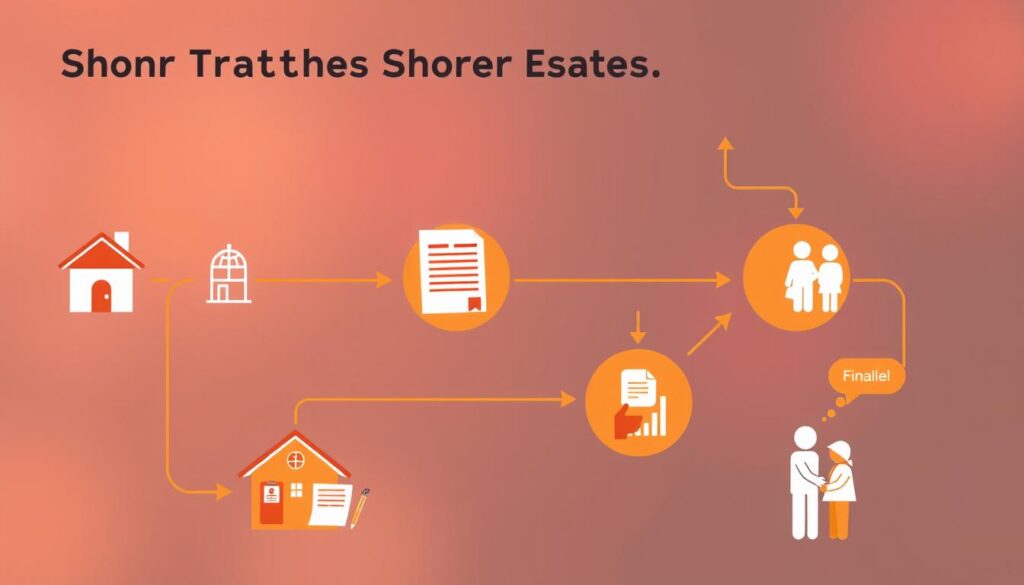Ever thought about selling your home for less than what you owe on your mortgage? This guide explores the short sale meaning in real estate. It’s a process where homeowners sell their property for less than the mortgage debt, often due to financial struggles. In today’s changing housing market, understanding short sales is key for sellers and buyers facing economic challenges.
Learning about the short sale process is important. It can be better than foreclosure for homeowners, lenders, and buyers. Join us as we dive into the details of short sales, making this complex real estate option clearer.
Key Takeaways
- A short sale allows homeowners to sell for less than their mortgage, providing relief in financial hardships.
- The process can take up to a year, making it more paperwork-intensive than traditional sales.
- Unlike in foreclosures, distressed homeowners can remain in their homes during the short sale.
- Short sales can benefit buyers through lower prices and fewer competition risks.
- Homeowners can often reenter the housing market faster after a short sale compared to a foreclosure.
- Approval for a short sale requires demonstrating financial hardship and property value below the mortgage payoff.
- Short sales may involve lender expectations for repayment of any remaining shortfall after sale.
What is a Short Sale?
A short sale is a complex part of real estate that homeowners might face when they’re in financial trouble. It happens when a homeowner sells their property for less than what they owe on the mortgage. The lender must agree to this, looking at the homeowner’s financial situation.
Definition of Short Sale
The short sale real estate definition is key. Homeowners use it when they’re facing big problems, like losing a job or a serious illness. They need the lender’s okay, as lenders want to get back as much money as they can without going through foreclosure.
Why Do Homeowners Choose Short Sales?
Homeowners pick short sales to avoid the bad effects of foreclosure. It helps keep their credit scores better and makes moving to cheaper housing easier. They might get help from their mortgage lenders, making the move smoother.
Even so, short sales are complex and come with challenges. They need detailed paperwork to show the homeowner’s financial struggles. Getting approval can take a long time, sometimes weeks or months. Knowing these details helps homeowners deal with their situation better.
Short Sale Meaning Explained
A short sale happens when a lender agrees to accept less money than what is owed on a loan. This usually occurs when a homeowner is in financial trouble and wants to avoid foreclosure. In a short sale, the money from the sale goes to the lender. They might still try to get the homeowner to pay the rest of the loan.
Knowing about short sales is key for both buyers and sellers. Sellers can avoid hurting their credit score as much as they would with foreclosure. Short sales can also help reduce the emotional stress of losing a home. Homeowners can stay in their home while the sale is being finalized.
For buyers, short sales offer a chance to buy homes for less than market value. However, buyers face challenges like finding properties and dealing with complex processes. It’s important for buyers to do their homework and work with experienced real estate agents.
To learn more about short sales, check out this short sale information. Understanding the details, like lender rules and market conditions, is crucial.

The Short Sale Process
Understanding the short sale process is key for homeowners facing financial trouble. It lets sellers sell their home for less than the mortgage debt, avoiding foreclosure. This journey involves several steps and lots of interaction with lenders.
Steps Involved in a Short Sale
The first step is gathering all needed documents to show financial hardship. This includes income statements, bank statements, and tax returns. Then, the seller submits a short sale application to the lender for review.
The whole process, from start to finish, can take 90 to 120 days. But, many things can change this time frame.
- Prepare the Property: Homeowners should list their property at a good price and make it attractive to buyers.
- Find a Qualified Buyer: Sellers need buyers who are already pre-approved for a mortgage to make offers easier.
- Submit the Short Sale Package: This includes the buyer’s pre-approval, net proceeds estimates, and a market analysis to support the sale price.
- Lender Review: After submitting the package, the lender will check the offer and decide if to proceed. Delays happen if the package is missing something, needing more documents.
- Final Approval: After checking, the lender might approve the short sale. This usually takes 60 to 120 days, depending on the situation.

Lender Approval
Lender approval is key in the short sale process. Lenders often prefer this option because it saves them time and money compared to foreclosure. They aim to recover as much loss as they can and help sellers clear their mortgage debt.
If the lender agrees, they might offer help with moving costs. Knowing how short sales work, including dealing with lenders, is crucial. Each step needs careful attention and the right documents to speed up approval.
For more on handling short sales, check out the short sale workflow.
Understanding Short Sale vs Foreclosure
Homeowners facing financial trouble often wonder about short sales and foreclosures. It’s key to know the differences in how they work and their effects. A short sale happens when a homeowner sells their house for less than what’s owed to the lender, needing lender approval. On the other hand, foreclosure is when the lender takes over the house after the homeowner misses payments, usually within three to six months.
Differences in Process
The short sale process can take three to six months or more. It involves a lot of paperwork and talking to the lender. Buyers might face more paperwork during this time.
Foreclosures, however, are faster. Lenders can sell the house quickly to get back their money. Homes in short sales are usually in better shape than those in foreclosures. This makes them more attractive to buyers.
Impact on Credit
The credit impact of short sales and foreclosures is different. Short sales are less harmful to credit scores than foreclosures. Foreclosures can hurt your credit for up to seven years.
But, those who do a short sale might be able to buy a new home sooner. They could qualify for a mortgage in just a few years. Those facing foreclosure might have to wait five years or more. Looking into short sale options can help homeowners recover financially.






